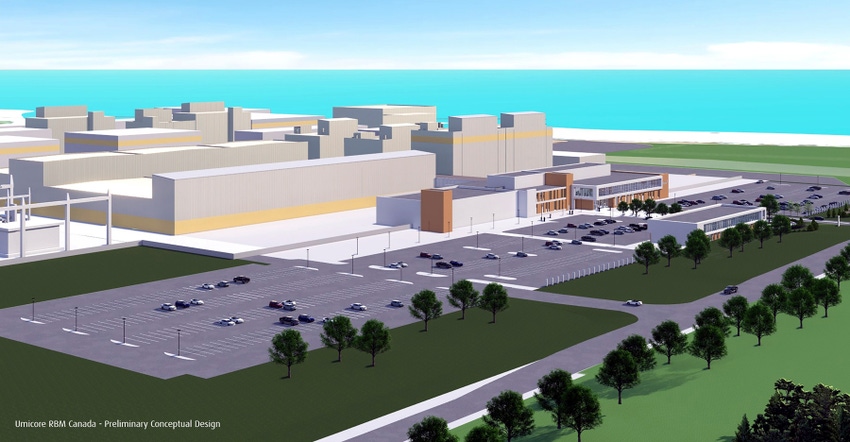Umicore NV Invests $1.39B in Canadian Facility, Forges AI Partnership with Microsoft
Global cathode materials supplier Umicore invests in a cutting-edge production facility in Canada and pioneers an AI collaboration with Microsoft to fast-track R&D.
February 27, 2024

In an increasingly tempestuous global lithium-ion battery industry, even slight missteps in supply-chain logistics or making the wrong investments in battery chemistry and energy density can sink a business. To avoid any such stumbling in the dark, multi-national cathode materials supplier Umicore NV is continuously and assiduously planning and executing their plan boldly. To wit:
Umicore is assertively accelerating implementation of cathode active materials (CAM) and precursor cathode active materials (pCAM) production and R&D worldwide across a range of cost and performance electric vehicle (EV) platforms.
Construction is underway on the new $1.39 billion Umicore production facility in Loyalist, Ontario, Canada, forecast to begin supplying North American cell and EV manufacturers in 2026.
To further accelerate and scale battery materials development, the company has just announced entering into an artificial intelligence (AI) platform development agreement with Microsoft.
Covering the full cathode spectrum
Brussels-based Umicore began researching CAM in 1995, and by 2015 was an early mover into industrial-scale CAM production at a time when its battery material production capacity was 15 gigawatt-hours (GWh) with facilities in China and Korea. Umicore was positioned as a Tier 2 supplier to OEMs at the time, technically interfacing with cell makers, Rob Privette, Umicore’s business development manager recently told Battery Technology.
By 2021, Umicore’s global CAM production capacity within the booming battery market was 65 GWh, including the first mass production of CAM in Europe. Umicore saw the supply chain develop with new OEM co-investment partnership models intended to secure raw material demand and share investments.
Concurrently, the company was advancing its technology roadmap and positioning itself as a supplier for different EV segments. “Ummicore’s CAM portfolio for Li-ion batteries spans the needs of entry, mass, and premium EV segments,” Privette says. “While lithium iron phosphate (LFP) chemistry is not in the Umicore portfolio, we see our high-voltage mid-nickel, highly-lithiated manganese (HLM) and cobalt-free nickel-manganese (NMx) cathode chemistries as key enablers for broad EV market penetration,” he describes.

Rob Privette, Umicore director of business development. Image courtesy Umicore.
With ongoing global R&D and expanding production, Umicore has aligned its technology development roadmaps with individual customers to pursue design-to-cost scenarios (high-voltage medium-nickel, optional zero or low-cobalt nickel manganese, and manganese-rich HLM cathode materials); and design-to-performance strategies emphasizing high-nickel and other next-gen solid state battery cathode materials, Privette adds.
“Our high-nickel design-to-performance materials target maximum energy density,” said Rohan Gokhale, PhD, applied technology manager, Umicore Battery Materials. “Our design-for-cost, highly-lithiated manganese HLM material also offer high energy density for a very cost-competitive price, comparable to LFP, and suitable for the mass market. Targeting the middle ground between optimizations for cost and performance, Umicore offers high-voltage medium-nickel and zero or low-cobalt nickel manganese compositions to cover the entire range of market requirements.”
North American debut coming
In October 2023, Umicore announced it was proceeding with the construction of a 35 GWh equivalent battery materials production plant in Loyalist, ON Canada, to serve the North American market for EV batteries. Given the significance of the plant for the North American EV supply chain and a strengthened EV battery ecosystem, Umicore will receive substantial financial support from the governments of Canada and Ontario for this key project, the company said in a press release.
The plant will be fully equipped to produce the most advanced high-nickel technologies and is prepared for future battery chemistries, including manganese-rich HLM and solid-state batteries.
The investment is part of Umicore’s previously announced plans and amounts to €1.27 billion (€0.69 billion after non-refundable capital expense grants) until 2026.
The engineering and permitting process is ongoing and Umicore has now begun construction on the 141-hectare/350-acre plot of land. The plant is expected to be commissioned at the end of 2025 with production ramping up in 2026.
Canada and the province of Ontario offer all the essentials for Umicore to establish its North American sustainable supply chain for battery materials. Located about 25 km/15 miles from Kingston, the plant in Loyalist will be at the heart of Canada’s automotive technology cluster. Its location offers critical advantages such as customer proximity, access to a highly skilled workforce, key infrastructure and renewable energy.
As part of Umicore’s objective to reach carbon neutrality for its scope 1 and 2 greenhouse gas emissions by 2035, the plant’s production will be carbon neutral from the start using renewable energy only, the company says. During the construction phase, the plant is expected to generate approximately 1,000 employment opportunities, while several hundred highly skilled positions will be created in operations. In addition, the region can anticipate a boost in indirect job opportunities.
Add the AI
Earlier this year, Umicore also announced entering into an agreement with Microsoft to use artificial intelligence (AI) as a means to facilitate and accelerate its research in battery material technologies for electric vehicles, a key growth area for the Group. It will make Umicore a first-mover in applying an AI-based approach to support battery scientists in developing new battery materials, enabling their faster time-to-market and an even more cost-efficient development process.
The Battery Materials AI platform will take advantage of Microsoft’s Azure OpenAI Service, extended with a multitude of unpublished, specific scientific AI Models, Umicore notes. It will be operated in a Umicore proprietary environment with full IP securitization. Umicore will create a tailored AI environment that will analyze, synthesize, and bring together decades of complex data from Umicore’s proprietary battery materials research and development. It will furthermore combine Umicore’s data with external historical data and information on the latest technologies from various sources, including simulation models, experiments, and images.
“With the support of Microsoft, Umicore will be the frontrunner in applying AI as a tool for our battery scientists to win time, efficiency and scale in our innovations while safeguarding our IP in this significant R&D area,” Umicore CEO Mathias Miedreich stated. “It will help us fully leverage all compelling internal and external data, to formulate new materials smarter and remain at the forefront in understanding and pre-empting customer needs in this fast-growing market.”
About the Author(s)
You May Also Like





